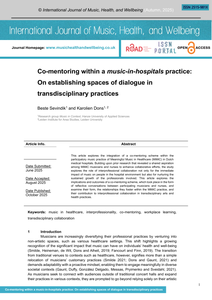This article explores the integration of a co-mentoring scheme within the participatory music practice of Meaningful Music in Healthcare (MiMiC) in Dutch medical hospitals. Building upon prior research that revealed a shared aspiration among MiMiC musicians and nurses to enhance collaborative efforts, the study explores the role of interprofessional collaboration not only for the immediate impact of music on people in the hospital environment but also for nurturing the sustained growth of the professionals involved. This article explores the implications and outcomes of a co-mentoring scheme, which took place in the form of reflective conversations between participating musicians and nurses, and examine their form, the relationships they foster within the MiMiC practice, and their contribution to interprofessional collaboration in transdisciplinary arts and health practices.
DOCUMENT

"Objectives: Research on what matters most to people with dementia is crucial for developing tailored interventions and support. This study explored how people with dementia experience their everyday lives, providing insight into what is important to them to live the best they can at home. Methods: Inspired by a phenomenological approach, open interviews were conducted with 15 people with dementia, supplemented by home tours and walking interviews. Data collection included one to three sessions per participant. Data were analysed using descriptive content analysis and followed the phases of open, axial, and selective coding. A co‐researcher group of seven people with dementia was consulted during the analysis to help interpret the emergent findings. Findings: Six dimensions of what matters most in everyday life were identified: 1) Engaging in meaningful activities, which included routines, household chores, leisure, day activities, and volunteering or work; 2) Keeping a sense of connection, in relationships within the home, with family, friends, groups, and the neighbourhood; 3) Having a sense of belonging, which included attachments inside and outside the home, and to cherished objects; 4) Connecting to self, which included the ability to reflect on past experiences, live in the present moment and anticipate the future; 5) Adjusting to ongoing changes, which included alterations in sensory perceptions, perceptions of the physical environment, and navigating shifts in interpersonal dynamics; 6) Being open to help and support, from professionals, community and society. Conclusions: For people with dementia, everyday life is a continuous balancing act between what matters most and what can be achieved daily. This is not only related to dementia but is also embedded in the wider perspective of life history, relational networks, and the physical environment. This study highlights the importance of identifying what matters most to people with dementia to provide person‐centred support."
MULTIFILE
